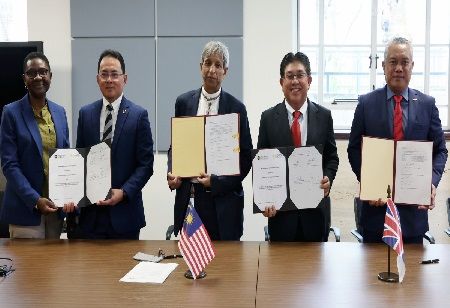- Azerbaijan and Malaysia plan to sign an MoU on higher education to strengthen academic cooperation, scholarships, and cultural exchange.
- Current student mobility includes Malaysian students in Azerbaijan and about 50 Azerbaijani students in Malaysia, highlighting mutual benefits.
- The MoU aims to institutionalize collaboration through research partnerships, staff exchanges, and curriculum development, fostering globally competent graduates.
Azerbaijan and Malaysia are set to cement their educational partnership in the form of a Memorandum of Understanding (MoU) on higher education, heralding a new era in bilateral relations. The news was conveyed by Azerbaijan's Minister of Science and Education Emin Amrullayev in a reception held in Baku in celebration of Malaysia's Independence Day, as reported by News.Az quoting local media. This action indicates the increased determination of the two countries to reinforce academic cooperation, enhance educational opportunities, and promote cultural exchange.
Minister Amrullayev emphasized the fact that Azerbaijani-Malaysian cooperation is gradually intensifying, and organized programs are planned to support student and teacher exchanges as well as scholarship. These efforts aim at improving the standards of higher education, encouraging cross-cultural learning, and exposing students to international academic standards. Among Azerbaijan's strategic goals in the education sector is to raise the number of foreign students attending the country, and the cooperation with Malaysia is likely to play a key role in this regard.
At present, there are five Malaysian students who are studying for their higher education in Azerbaijan, two of whom are enjoying the prestigious Heydar Aliyev International Educational Grant. This initiative clearly reflects the ambition of Azerbaijan to attract foreign students who are high-flying and offer them holistic assistance, including financial assistance as well as exposure to top-class study programs. Baku authorities are hoping that as awareness increases about Azerbaijan's educational opportunities, Malaysian students will become more interested, leading to increased interaction between the two nations' student communities.
Also Read: NUS Trains Students to Manage Tourist Traffic and Restrict Peak-Hour Access
Concurrently, the exchange is two-way. Around 50 Azerbaijani nationals are enrolled in Malaysia today, benefiting from the diversity of academic courses and globally accepted institutions available there. The increasing number of Azerbaijanis in Malaysia shows the mutual advantages of educational exchanges and the common interest in developing knowledge, innovation, and border-spanning academic networks.
The proposed MoU is likely to institutionalize and consolidate these efforts into a framework for continued cooperation in higher learning. In addition to scholarships and exchanges, it could also lay the ground for collaborative research studies, staff exchange, and the sharing of best practices in academic management and curriculum design. By deepening these bonds, Azerbaijan and Malaysia look to prepare a future generation of graduates with international outlooks, technical expertise, and cultural competency who can contribute in meaningful ways to their respective homelands.
This expanding cooperation in education not only increases access to learning possibilities but also solidifies the diplomatic and cultural relations between Azerbaijan and Malaysia. With both-way student mobility growing, the educational exchange will be expected to drive long-term cooperation in other areas and consolidate the two nations' bilateral ties. With the MoU in the pipeline, the two nations stand to establish a stronger and more mutually advantageous academic partnership, embracing a common spirit of educational brilliance and global collaboration.

